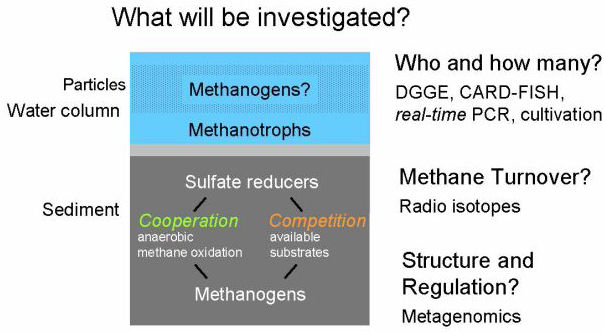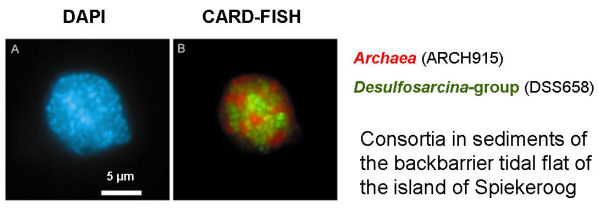
BioGeoChemistry of Tidal Flats
Methane cycle in the Wadden Sea
Methane concentration in the Wadden Sea are about two orders of magnitude higher than in the open ocean. However, the sources and sinks of this climate-active gas in the Wadden Sea are still largely unknown. This finding of
In this sub-project, we will investigate the methane cycle in all parts of the tidal flats (sediment, particles and water column). Therefore, methane concentrations during tidal and seasonal cycles will be measured. Microorganisms that are involved in the methane cycle will be quantified, isolated and characterized physiologically. Especially the competition and cooperation of methanogens and sulfate reducers will be analyzed in collaboration with sub-project 6.

The first two topics will be analyzed by the Paleomicrobiology group of the ICBM in Oldenburg, whereas the whole genome analysis will be performed by the Department of molecular ecology of the MPI for marine microbiology in Bremen.
Metagenomics
The majority of microorganisms that catalyze biochemical reactions in a habitat are not yet cultured. Therefore, culture independent molecular biological techniques are applied to analyze the genes that are involved in biochemical processes. The metagenome comprises the genetic information of all the microorganisms from one habitat. Using a metagenomic approach, complete gene cassettes are isolated and cloned into E. coli. In our sub-project, such a clone bank is the target to search for structure and regulation of key enzymes of the methane cycle. The big advantage of this approach is its independency from cultivation techniques.
Anaerobic methane oxidation
One part of the methane cycle is the anaerobic oxidation of methane. For deep sea sediments it was shown, that this reaction is catalyzed by two different microorganisms that live in close contact as so called consortia. These consortia of methanogenic archaea and sulfate-reducing bacteria have recently been detected in Wadden Sea sediments by Ishii et al.

This discovery offers the advantage to analyze the process of anaerobic methane oxidation at low pressure and moderate temperatures. The metagenomic approach will elucidate whether the existing operon structures are similar to those of methanogens and (an)aerobic methane oxidizers of other sampling sites like Hydrate ridge or the Black Sea.
This sub-project has started in the second phase of the Research Group "BioGeoChemistry of Tidal Flats" and we are still in the beginning of our investigations. The analysis of a sediment sampling campaign that was performed in November 2004 is currently under progress. The first results will be expected soon...
| <<back | More details
|